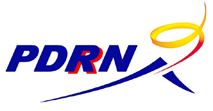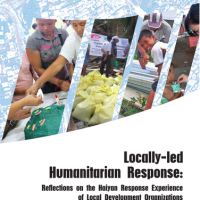The People’s Disaster Risk Reduction Network, Inc. (formerly the Pampanga Disaster Response Network or PDRRN), is a development and humanitarian non-government organization working primarily in high-risk but least served communities in the Philippines through community-based disaster risk reduction approach. Since its establishment prior to the Mt. Pinatubo eruption in 1991, PDRRN has worked with community-based disaster response organizations, local government units (LGUs), government agencies, and civil society organizations to advance the DRR work in the country. PDRRN is a member of the Humanitarian Response Consortium (HRC), Alliance of Sphere Advocates in the Philippines (ASAP), Disaster Risk Reduction Network-Philippines (DRRNetPhils.) and the Southern NGO Network.
PDRRN sees the World Humanitarian Summit 2016 in Istanbul, Turkey as an important step for all development and humanitarian actors, primarily the UN member states to reaffirm their commitments to humanity and humanitarian principles, and agree on commitments for effective delivery of humanitarian assistance that promotes the dignity, safety and rights of disaster-affected women and girls, men and boys and other vulnerable sectors.
As we endorse the Charter for Change that calls for localizing humanitarian aid, PDRRN shall strive to improve its own capacity and continuously work with other stakeholders in putting people at the center of humanitarian aid and building local humanitarian leadership.
Our Commitment:
Core Responsibility 1: Political leadership to prevent and end conflicts
The search for sustainable peace and respect for human rights remains a challenge in Mindanao, Philippines. For decades, the recurring fighting between Muslim armed groups and the Armed Forces of the Philippines has claimed lives and displaced communities causing suffering and uncertainty to affected populations. In 2015, UNHCR report showed 407,397 persons were forced to flee their homes due to various forms of conflict and natural disasters, of which 37,000 persons were repeatedly displaced due to conflict, clan war and violence.1 The fulfilment of selfdetermination of Muslim population is integral in achieving sustainable peace in Mindanao. Peace initiatives continue to fall short since the ‘70s until the recent non-passage of the Bangsamoro Basic Law (BBL) by the Philippine Congress. The BBL is the central component of the peace negotiation between the Philippine Government and the Moro Islamic Liberation Front (MILF).
Under a new administration after the May 9, 2016 national and local elections, PDRRN will work with other civil society organizations to urge the new administration to:
- Initiate and continue the peace process and work for the passage of an inclusive Bangsamoro Basic Law.
- Pass a law that protects the rights of internally displaced persons (IDPs) aligned with the United Nations Guiding Principles on Internal Displacement (UNGPID) and internationally accepted standards.
Core Responsibility 2: Uphold the norms and safeguard humanity
The Philippines has been confronted with localized armed conflicts between the Armed Forces of the Philippines, the Muslim armed groups in Mindanao, and the New People’s Army (NPA) of the Communist Party of the Philippines in several provinces in the country. For decades, these conflicts have already claimed thousands of lives. Given this reality, there is a limited awareness of the rules of armed conflict among Filipinos, and even the international humanitarian law is largely unknown.2 Though in 2009, Republic Act 9851 or the “Philippines Act on crimes against International Humanitarian Law, Genocide and other crimes against Humanity” was enacted, its implementation remains a challenge. Related to this, PDRRN will work on the following:
- Ensure that PDRRN personnel and partners share a common understanding of and commitment to adhere to the humanitarian guiding principles, the Code of Conduct, the Humanitarian Accountability Partnership, Sphere, and the Core Humanitarian Standard in all of PDRRN’s humanitarian response.
- Ensure that all its personnel have the competencies in analyzing and integrating gender and protection principles in PDRRN’s humanitarian action and responding to GBV cases.
- Make RA 9851 and the IHL integral contents of PDRRN’s training, information and communication program to increase public awareness of IHL principles and goals.
- Work with other organizations to be vigilant in monitoring and reporting violations of human rights and international humanitarian law.
- Engage in advocacy and campaigns to demand government for durable solutions in conflict and disaster affected areas.
Core Responsibility 3: Leave no one behind
In 2014, more than 19.3 million people were displaced due to disasters around the world.3 The Philippines is one of the countries with the highest number of displaced people due to conflict, violence and natural disasters.
The sporadic occurrence of conflict and recurring natural disasters have forced thousands of people to flee their homes almost every year – from Typhoon Pablo (Bopha) in 2012, Typhoon Yolanda (Haiyan) in 2013, Typhoon Glenda (Rammasun) and Typhoon Ruby (Hagupit) in 2014, the on and off armed conflict, clan war and generalized violence in the Autonomous Region of Muslim Mindanao (ARMM), the provinces of Maguindanao and North Cotabato, and the Moro National Liberation Front (MNLF) siege in Zamboanga City in 2013 – challenging the capacity of humanitarian actors specifically the government. As of May 2015, at least 119,000 people remained displaced due to conflict and violence, and at least 140,000 people are still displaced due to natural disasters. 4 The almost 259,000 IDPs in the country today are still longing for safe and permanent resettlement that will allow them to access social services and livelihoods in order for them to have peace of mind and prosper as dignified human beings.
PDRRN commits to:
- Reaffirm its basic criteria of prioritizing disaster-affected high-risk but least served communities.
- Improve the existing tools in disaster assessment and response planning that will identify and address practical and strategic needs of vulnerable women and men, boys and girls, persons with disabilities (PWDs), the elderly, female-headed households, and those living below the poverty line. Related to this, PDRRN will develop partnership with other groups that cater to specific vulnerable groups to ensure a more inclusive humanitarian response.
- Engage women’s groups in humanitarian response and protection. For years, PDRRN has been working with community-based disaster response organizations that are mainly led by women and created spaces for their meaningful participation in the response. PDRRN shall continue supporting and developing women leaders and decision-makers in humanitarian action.
- Start tapping youth potentials by engaging them in community-based disaster risk reduction activities specifically on preparedness and humanitarian response.
- Work with other national and local NGOs to urge the Philippines Government to strengthen the country’s mechanisms for hosting refugees. On the other hand, PDRRN shall ensure the protection of Filipino migrants living in countries in crises by advocating for the improvement of the Philippine standards on evacuation, resettlement and reintegration.
- Work with other stakeholders to advocate for the passage of a law that protects the rights of internally displaced persons (IDPs) and adheres to UNGPID.
Core Responsibility 4: Change people’s lives, from delivering aid to ending need
PDRRN commits to:
- Reaffirm our belief in people centred development oriented humanitarian response that builds on people’s inherent capacities to anticipate, cope with, respond to and recover from disasters. PDRRN will invest time and resources in organizing the most vulnerable men and women in high-risk communities, build their understanding of risk, enable them to act together in managing risks, develop their confidence in voicing-out their opinions especially in engaging with other humanitarian actors and take part in building the path towards their community’s resiliency and development.
- Pursue long-term development programming with the communities and the local government units to address decades-long poverty that create people’s vulnerability. PDRRN shall improve its skills and technology for community risk assessment and conduct regular updating of risk assessment together with members of the community.
- Work with community front-line structures such as community-based people’s organizations and Barangay Councils to lead in disaster preparedness, response, rehabilitation and development programming. We commit to sustain our capacity-building endeavour with communities and other local stakeholders on disaster preparedness towards an effective humanitarian response. We will continue to assist communities and LGUs in formulating hazard specific contingency plans, setting-up of early warning system and the conduct of community drills.
- Actively engage government agencies, local government units, NGOs, private sector, religious, community organizations and other stakeholders in strengthening local coordination mechanisms to promote synergy, complementation of assistance and services.
- Increase our capacity together with other members of the Humanitarian Response Consortium in cash-transfer programming as priority intervention.
- Strengthen PDRRN’s facilitating role in articulating needs of communities to make donors and government aware of community priorities addressing disaster impacts.
- Work with other local and national NGOs, people’s organizations and the government in the process of framing Local Development Plans and the “Philippine Medium Term Development Plan” that incorporates risk analysis, people’s priority and needs, clear implementation mechanisms, and aligned with the Philippine commitments to the Sendai Framework for Disaster Risk Reduction (SFDRR) 2015-2030, the 2030 Agenda for Sustainable Development, the Paris Agreement on Climate Change and in the WHS. Related to this, PDRRN will likewise continue to support the call for the passage of the “National Land Use Policy”.
Core Responsibility 5: Invest in humanity
- Build principled partnerships. PDRRN shall strengthen its working relation with government agencies, LGUs, people’s organizations, local/national NGOs, INGOs and other stakeholders. We reaffirm and adhere to the “Principles of Partnership” endorsed by the Global Humanitarian Platform in July 2007 that emphasizes equality, transparency, result-oriented approach, responsibility and complementarity. We recognize that individual approaches to humanitarian work and power dynamics with various stakeholders within a partnership may affect relationships, but, in general we believe that the humanitarian partnership approach will be more effective if the elements of solidarity, trust and confidence are present. Enhancing the capacity of the government to lead now and in the future must be in the forefront of the partnership.
- Build on and strengthen local and national capacities towards an effective humanitarian action.
- PDRRN will actively engage in developing the national platform model with clear proactive coordination agreements among the national NGO networks in the Philippines.
- Work to increase the capacity of the Humanitarian Response Consortium (HRC) with innovations in disaster preparedness and more effective humanitarian response. Related to this, we commit to improve our ability to deliver services, strengthen financial management and logistical support system to comply with the donor requirements.
- Diversify PDRRN’s resource options to reduce dependency on INGO and donor partners.
-
Institutionalize national humanitarian standards as framework for an effective humanitarian action. PDRRN will launch an advocacy for the National Disaster Risk Reduction and Management Council (NDRRMC) to adapt an acceptable and appropriate “national humanitarian standards” guided by existing universal norms, principles, and standards as a policy of the state under RA 10121, Section 2, b.
-
Exercise greater accountability to disaster-affected people and communities. PDRRN shall continuously practice transparent and accountable management of humanitarian response by engaging the disaster-affected people and communities in the process of assessment, planning, monitoring and evaluation. Public disclosure (specifically in partner communities) of plans, processes, progress, acquired resources, and investment shall be an integral part of PDRRN’s accountability mechanism. On the other hand, PDRRN shall strengthen its management capacity to comply with the requirements of its partner donor agencies.
-
PDRRN shall continuously focus its interventions at the community and municipal levels as the primary locus of change. Given the limitations of many low-income LGUs, PDRRN will continue to support capacity building of LGUs to carry their obligations to respect, protect and deliver the rights of its constituencies. This is cognizant with organizing the most vulnerable population towards empowering them as individuals, groups and communities to better prepare and respond to emergencies.

